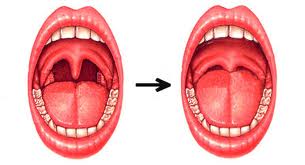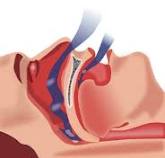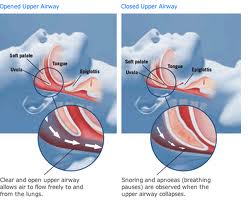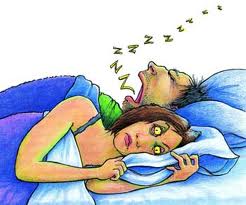Sleep apnea syndrome (SAS) is a condition presenting with many pauses in breathing while a person is asleep. The condition was first described in literature by Dickens in the Pickwick Papers and hence sometimes referred to as the pickwickian syndrome.
A person has SAS if he stop breathing 5 or more times in 1 hour while asleep. Or, if he stops breathing 30 or more times during a 6 hour sleep period.

SAS can be of two types:
Central and Obstructive (OSAS)
In central variety, the airways stay open, while the chest muscles and diaphragm stop working. This occurs mostly when the respiratory centres within the brain are impaired (as happens with drugs like heroin, and other opiates).
Premature children, persons on tranquilizers are more prone to CSAS.
Obstructive sleep apnea is the most common category of sleep-disordered breathing
When sleeping, muscle tone of the throat and neck, as well as the vast majority of all skeletal muscles, is reduced allowing the tongue and soft palate/oropharynx to relax.
In the case of sleep apnea, this impedes the flow of air to a degree ranging from light snoring to complete collapse.
Conditions associated with OSAS.
- Enlarged tonsils or adenoids (EBV infections),
- Left palate,
- Downs syndrome,
- Treacher Collins syndrome,
- Pierre Robin Sequence etc.
- Obesity.
Risk factors
Most adults with sleep apnea are obese, with particular heaviness at face and neck.
Men are more often affected than women.
Children and toddlers with defects like Down syndrome, cleft palate etc.
Symptoms of Sleep apnea syndrome
Central sleep apnea causes:
- Excessive daytime sleepiness
- Irritability
- Lack of concentration
- Sleep deprivation
- Increased blood pressure & Heart disease
- Increased frequency of nocturnal urination.
- Esophageal reflux and heavy breathing at night.
Obstructive sleep apnea causes:
- Loud snoring
- Daytime drowsiness
- Memory loss
- Limited attention
- Morning headaches
- Lethargy
Associated health problems
- High blood pressure
- Stroke
- Heart attack
- Heart failure
- Pulmonary Hypertension
- Diabetes
- Kidney failure
- Metabolic syndrome
- Oxidative stress
- Sudden death
Sleep Deprivation due to Sleep Apnea and insufficient sleep are common and can present as insomnia, narcolepsy, or idiopathic hypersomnia (increased sleepiness). In infants and children sleep problems commonly present themselves as ADD or ADHD.
Homeopathic Treatment for Sleep apnea syndrome:
Homeopathy is strongly recommended for the treatment of Sleep apnea syndrome. Homeopathy addresses the underlying cause as well as the symptoms which are actually the end result of the disease process.





